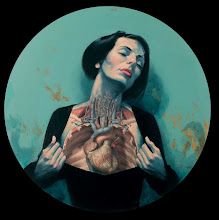 “Evil is the exercise of power to intentionally harm (psychologically), hurt (physically), or destroy (mortally or spiritually) others.”
“Evil is the exercise of power to intentionally harm (psychologically), hurt (physically), or destroy (mortally or spiritually) others.” Phillip Zimbardo,
The Lucifer EffectI believe that people are not inherently evil. Evil, as Zimbardo defines it, is the deliberate misuse of power to the detriment of others. Like a cancer, it grows until it ultimately affects one’s ability to function healthily, thrive spiritually, and be a positive influence in the world. Evil, like sin, is “missing the mark,” or as other traditions might put it, focusing on and identifying with the wrong things. Someone under “The Lucifer Effect” might start out with good intentions, but ultimately succumb to the dictates of his ego.
There are few weightier crimes than feigning a life of spirituality yet persisting in acts that are meant to harm or destroy others. Many of these self-proclaimed spiritual people rise to power and have caused entire civilizations to fall, for the seed of selfishness is one persistent son-of-a-bitch and hard to eradicate.
As the story goes, Lucifer was beloved of God and handsome to boot, but power hungry, greedy and selfish, not unlike we humans.
“God is good and dwells within us,” says the charlatan priest after committing an unspeakable act. The Devil apparently does too. When we do good things, we may say that God deserves the credit, but when we commit acts of harm, it is the devil within us that has caused us to fall. While there is still an ego-self ready and waiting for personal gain and glory, or even the rejection thereof, there will be problems. There will be suffering. There will be division.
Every harsh word spoken is a boomerang back to our own hearts. When our hearts are made of steel, we cannot feel their impact. As our hearts soften, the barbs of our speech fly back and cut into us. We bleed. In short, we harm ourselves the most when we intend to cause harm to others.
When newly in love, we overlook the signs that herald abuse, immaturity, and self-centeredness. We want to see the best in others and so we believe what they say and what they promise, often discounting what they do. Within them we see a golden vessel of love, albeit obscured in excrement caused by the pain of living, by repeated disappointments, by fear, greed, and selfishness. If we were simply to observe, we would see clearly. But years go by and nothing changes, except perhaps a few pieces of excrement get washed away by time, by chance.
Forgiveness is a difficult concept. How do we forgive someone who intentionally causes us harm? It does not mean forgetting, nor does it mean providing infinite chances to those who say they intend no harm but continue to act to the contrary. Forgiveness means understanding the pain that drives us to do harmful things. To see it clearly for what it is. It means releasing that pain in ourselves, the pain that might cause us to harm others. If we truly honor ourselves, we can not allow others to to harm us. Certainly, some are held captive without possibility of physical escape, yet even they can find sanctuary within where no harm can enter.
In clearly seeing suffering we see the root of what we call evil. And these roots are deeper than we can possibly imagine. Buddhism teaches that it is not the mind alone that must be trained; the heart must also be opened. An open heart without wisdom is doomed. A sharpened intellect without true compassion, worthless.
Be wary of those who call themselves spiritual but have their own interest at heart. While there may be a glimmer of truth in what they say, watch and wait and see what they do. Wish for them the fire, that they too may be robbed of everything but empty equanimity and infinite kindness. For if man cannot see and feel the ripple of his actions and intent upon the world, he is blind.
To see, to feel, and to ultimately understand the nature of suffering, guides us in ways no teacher or teaching can. It is simple and always with us. There is no price to be paid for what is already ours. Yet we often give people in power our trust, our hearts, and sometimes our lives. Entrusted to preserve the myth they market as Truth, they feed upon those thirsty for solution, saying they have special training or powers. Yet, they too are human, many suffering far more than those who kneel before them to receive a blessing.
Why, o spiritual seeker, do you continue to drink from a golden vessel covered in excrement? You alone must realize your own truth. Remove neediness and grasping. Do not look outside yourself. You are sufficient as yourself. Deep within you is the pulse of your divine wisdom, ever beating. Realize it and be free.
 Like a 5 year-old kid on Christmas Day, I awoke with an awe and wonder uncapped and ready to explode. Barely light, my siblings are still soundly sleeping. I take a peek into their bedroom to make sure. The door is wide open and I need a body count. Perhaps one of them is up to share in my joy. I counted—one, then two lumps under the down comforter. Careful not to wake them, I slowly retreat; gin martinis and a full-bodied Italian dinner the night before had set them into a deep rest.
Like a 5 year-old kid on Christmas Day, I awoke with an awe and wonder uncapped and ready to explode. Barely light, my siblings are still soundly sleeping. I take a peek into their bedroom to make sure. The door is wide open and I need a body count. Perhaps one of them is up to share in my joy. I counted—one, then two lumps under the down comforter. Careful not to wake them, I slowly retreat; gin martinis and a full-bodied Italian dinner the night before had set them into a deep rest. 



